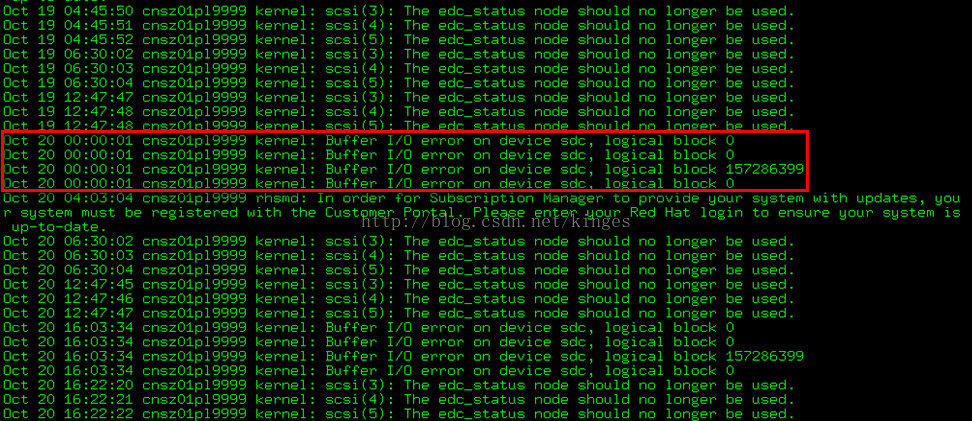
Buffer I/O errors occurring on SAN devices presented to Linux host using Linux native multipathing.
kernel: Buffer I/O error on device sdb, logical block 0
kernel: Buffer I/O error on device sdb, logical block 1
kernel: Buffer I/O error on device sdb, logical block 2
kernel: Buffer I/O error on device sdb, logical block 3
A server using a LUN, which is presented by a storage array through fabric channels, may show buffer I/O errors while the server is booting or commands such as fdisk and vgscan are being run. The access can be a read or write attempt. These messages are sometimes harmless. When using PowerPath, these errors are suppressed. However, in the case where Linux native multipathing is used, there is no automatic provision for filtering these messages.
The errors can occur when using an active/passive storage array, such as EMC Clarion series. These types of SANs contain two storage processors. LUNs are assigned to only one of the processors at the time of LUN creation. The LUN can receive I/O only via that one processor. The other processor is passive; it acts as a backup, ready to receive I/O if the active controller fails, or if all paths to the LUN via the active controller fails.
Paths to the LUN going via the passive controller are passive paths and will generate an I/O errors should I/O be sent over them. At bootup, the kernel’s SCSI mid-layer scans all paths to find devices. Thus it will scan both active and passive paths and will generate buffer I/O errors for the passive paths.
This is a normal behavior for Linux native multipath, and the errors do not indicate an array issue. The errors can safely be filtered through the OS logging configuration or the user can avoid access to native devices (as opposed to using /dev/mapper devices). Alternatively, a qualified version of PowerPath may be installed, which will automatically filter these errors.
Read More:
- [Solved] kernel: nvme nvme0: I/O xxx QID xxx timeout, aborting
- Error: an error occurred while performing the step: “building kernel modules”. See/var/log/NV
- [Solved] keil2 Error: FATAL ERROR L210: I/O ERROR ON INPUT FILE
- MFC:: error C2065: “IDD_DIALOG1”: undeclared identifier Sending and handling custom messages in MFC threads
- [Solved] kafka Startup Error: ERROR Shutdown broker because all log dirs in /…/kafka/logs have failed (kafka.log.LogManager)
- [Solved] validateNewTexture:89: failed assertion `BytesPerRow of a buffer-backed texture with pixelFormat
- [Solved] org.apache.spark.SparkException: Kryo serialization failed: Buffer overflow
- Peewee insert data error:’buffer’ object has no attribute’translate’
- Android studio does not prompt error messages [How to Solve]
- [Solved] MATLAB and pycharm open error messages at the same time
- [Solved] WeChat development tools error: Argument 0 must be a buffer source or a WebAssembly.Module object
- [Solved] Error: package or namespace load failed for ‘ggplot2’ in loadNamespace(i, c(lib.loc, .libPaths()), v
- log4j Error: Please initialize the log4j system properly [How to Solve]
- [Solved] ES Query SIZE too large Error: ENTITY CONTENT IS TOO LONG [105539255] FOR THE CONFIGURED BUFFER LIMIT [104857600]
- How to Solve m_gshhs_i Error
- [Solved] Clickhouse Error: DB::Exception: Cannot lock file /var/lib/clickhouse/status
- [Solved] Error: Undefined symbol DMA_Cmd (referred from dac.o)
- Start error in maven web project java.lang.ClassNotFoundException: org.springframework.web.util.Log4jConfigListener
- [Solved] Error: L6218E: Undefined symbol vApplicationGetIdleTaskMemory (referred from tasks.o).